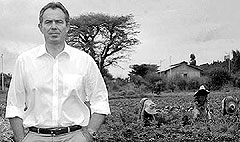
| HOME |
| NERVE |
| REVIEWS |
| ARCHIVE |
| EVENTS |
| LINKS |
| ABOUT US |
| CONTRIBUTORS |
| BACK ISSUES |
| CONTACT US |
 In
just a few months, leaders from the world's eight wealthiest countries
will meet in the plush surroundings of the 850-acre Gleneagles Hotel,
a golf resort in Perthshire, Scotland. Although this playground of the
rich seems a strange venue for discussions about third world poverty and
the fight against climate change, they are likely to be host, Tony Blair's,
chosen topics for discussion at the G8 summit. Adam
Ford asks what is the G8, what powers does it have, and just what
is the government proposing?
In
just a few months, leaders from the world's eight wealthiest countries
will meet in the plush surroundings of the 850-acre Gleneagles Hotel,
a golf resort in Perthshire, Scotland. Although this playground of the
rich seems a strange venue for discussions about third world poverty and
the fight against climate change, they are likely to be host, Tony Blair's,
chosen topics for discussion at the G8 summit. Adam
Ford asks what is the G8, what powers does it have, and just what
is the government proposing?
Hearts of Gold
Will Blair and Brown end African poverty and save the world?
The 1970s were a time of enormous economic changes. Spiralling oil prices led to a recession that engulfed most of the western world and shook up economists who had predicted continual growth if governments intervened in markets. In 1973, the United States set-up the 'Library Group' - an informal network of finance ministers from a small group of nations that met to discuss ways out of the crisis. In 1975, the 'Group of Six' was born in Rambouillet, when France, the US, UK, Japan, Italy and Germany agreed to annual meetings. Since then, Canada and Russia have joined the club, and discussions have widened to take in any and all economic issues. Though the body has no formal powers, the policies decided behind closed doors at G8 summits are put in force around the world. Historically, these policies have seen the abolition of rules protecting workers, led to the sell-off of community resources - such as water - and have promoted business interests over those of the voiceless and powerless on every continent.
The last time the summit came to our shores was in 1998, when quite a small number of protesters greeted Blair, Clinton and others at the Birmingham NEC. Since then, a global protest movement has emerged, determined to show its opposition to what has become known as 'globalisation' and the trail of war, poverty and disease that 'anti-capitalists' believe it creates. In response, global summits have moved to ever more remote locations, hoping to leave the protests far behind. Police are planning a multi-million pound security operation in the rural idyll for the weekend of 6-8 July, when the presence of George Bush and others is sure to attract activists from around the world.
But apparently Tony Blair doesn't know what all the fuss is about, and recently told the Scottish Labour Party conference that: "It would be very odd if people came to protest against this G8, as we're focusing on poverty in Africa and climate change. I don't quite know what they'll be protesting against." So why aren't those pesky activists happy with the Blair/Brown agenda?
 On
the subject of African poverty, both the Prime Minister and the Chancellor
have made much of their concern, calling the problem "a scar on the
conscience of the world" and talking of a "moral sense"
that should lead rich nations to help the poorest. According to the government's
G8 website, any new plan must "place African countries, both individually
and collectively, on a path of sustainable growth and development",
and enhance Africa's "full and beneficial integration into the global
economy". With newspaper headlines fanfaring his generosity, Gordon
Brown has proposed a "new Marshall plan", offering debt relief
to poor countries.
On
the subject of African poverty, both the Prime Minister and the Chancellor
have made much of their concern, calling the problem "a scar on the
conscience of the world" and talking of a "moral sense"
that should lead rich nations to help the poorest. According to the government's
G8 website, any new plan must "place African countries, both individually
and collectively, on a path of sustainable growth and development",
and enhance Africa's "full and beneficial integration into the global
economy". With newspaper headlines fanfaring his generosity, Gordon
Brown has proposed a "new Marshall plan", offering debt relief
to poor countries.
But some remain far from convinced of Labour's good intentions. John Hilary,
Director of Campaigns and Policy at War on Want has argued that: "Compassionate
rhetoric cannot disguise the reality of the government's neoliberal policies.
As long as Blair and Brown continue to push free trade and privatisation
on developing countries, more and more people will be pushed deeper into
poverty, not lifted out of it." Similarly, Mark Curtis of the World
Development Movement (WDM) and author of Web Of Deceit is dismayed that
many people still take Blair and Brown at their word: "There is a
great myth currently being peddled not only here but elsewhere in Europe
- that the British government has a positive development agenda and is
a champion of the world's poor. Tony Blair and Chancellor Gordon Brown
are posing as the saviours of Africa. The mainstream media have fallen
for it; every other week they dutifully report another supposedly new
government initiative as displaying the wondrous morality of our leaders.
Ministers might be liars and criminals on Iraq, but at least they really
care about global poverty." Further, the WDM claims that debt relief
is merely a tool to prise open the African economy to first world business
and the kind of policies that have brought poverty to so many in Asia
and South America. Indeed, Gordon Brown told the House of Commons that:
"If the developing countries are prepared to open up to trade and
to allow private investment to play its role in the development of their
countries, we must in turn support them..."
The government's attitude to the environment has also attracted suspicion
from campaigners. Friends of the Earth's Eve Mitchell commented "The
government seems to think it can tackle poverty and prevent climate change
by pushing the policies that created them in the first place.” Despite
international obligations to cut the UK's emissions of the most damaging
gases, carbon dioxide levels have increased since Labour came to power
in 1997, and last October the government announced plans to let industry
increase pollution levels until 2007. This came just days after Blair
warned that climate change poses an "irreversible and destructive"
threat.
On 2nd July 2005, a massive protest march is due to make its way through
Edinburgh, organised by the group Make Poverty History, whose high profile
'white arm band campaign' is supported by celebrities such as Dawn French,
U2's Bono and Tony Blair himself! Authorities had hoped that allowing
the march would deter protesters at the summit itself four days later,
but more radical groups such as Dissent are hoping to disrupt proceedings
and make their presence felt. The biggest police operation in Scottish
history is likely to be mounted in order to protect the politicians.
Following the Great Crash of 1929, economist JK Galbraith declared that big meetings are called "not because there is business to be done, but because it is necessary to create the impression that business is being done". Whilst some important decisions may well be made on the golf course at Gleneagles this July, there is some doubt as to just who will benefit from them. Faced with ever-growing popular protest against their policies, the politicians who control the richest nations have secluded themselves ever further away from ordinary people. Though there has been much talk around the world about righting wrongs in Africa, it is easy to be suspicious of those so keen on hiding in luxury.
For more information on the G8 summit, you can visit the following websites:
www.g8.gov.uk
www.makepovertyhistory.org
www.dissent.org.uk
www.wdm.org.uk
Printer friendly page